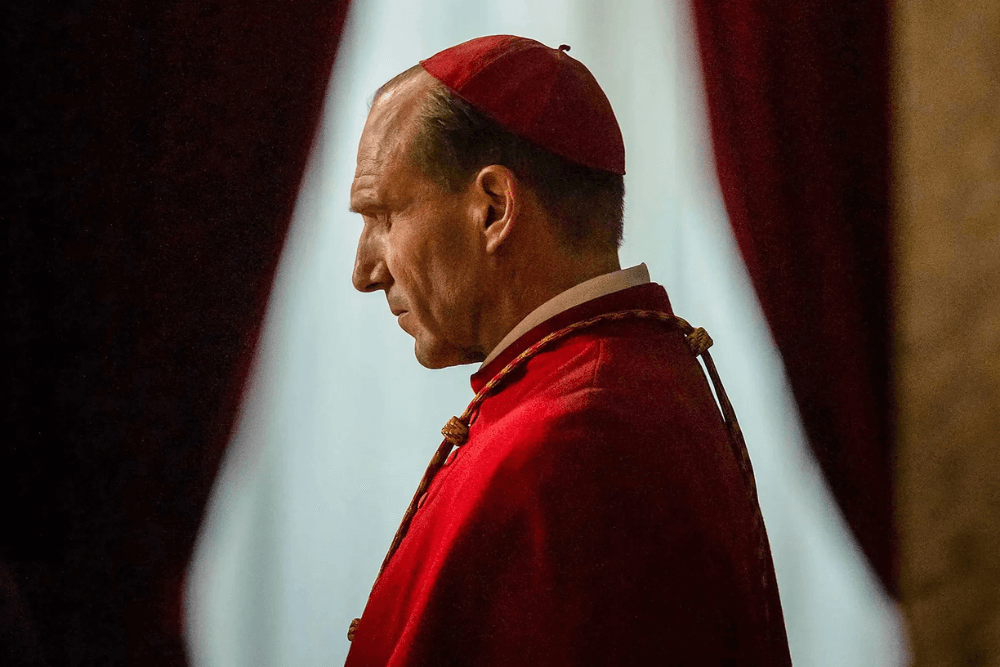
Conclave, which releases in theaters today, is many things. It’s a religious movie about the election of a pope. It’s a psychological thriller with political intrigue. It’s an homage to the importance of doubt. But perhaps most slyly, it’s a surprisingly sharp commentary on gender in the Catholic Church.
Directed by Oscar-winner Edward Berger (All Quiet on the Western Front), Conclave begins when the pope dies unexpectedly. To elect the next pontiff, the College of Cardinals convenes in the Vatican, entering total seclusion from the outside world until a majority vote can be reached. But if God is working through the cardinals, so too is something darker: ugly hunger for power and bitter ideological divide.
A number of ambitious priests are vying for the pontificate: the liberal Cardinal Bellini (Stanley Tucci), the ultra-conservative Tedesco, and the strongly anti-LGBTQ+ Adeyemi, who would be the first Black pope. The cardinals are also joined by a stranger — a man anointed cardinal in secret by the pope, his existence kept hidden. This is only the first in a series of secrets and scandals that threaten to undermine the conclave as political maneuverings begin.
“I didn’t look at [Conclave] as a church movie; I looked at it more as a political conspiracy thriller,” said director Edward Berger, who said he drew inspiration from American ’70s thrillers.
But even “more important for the film than the political plot,” Berger told Sojourners, is “100 percent the journey of doubt.” Cardinal Lawrence (Ralph Fiennes), a man bound by duty but beset by doubt, reluctantly leads the conclave. He struggles religiously and doesn’t know what the right decisions are. Powerfully portrayed by Fiennes, his doubt creates a creeping dread in the high stakes game of choosing the next pope — and by extension, the political ideology that will rule the Vatican.
Conclave is clear about the ideological divides in the current church: issues of LGBTQ+ rights, women clergy, the Latin Mass, racism. European candidates vie against African cardinals. Cardinals affect humility to hide their hunger for power. They argue about moral relativism and accepting other religions. In this conflict lies much of the tension and the doubt that makes Conclave so propulsive: Is it right to take down a religious opponent if you think their past is sinful or their views are a threat to the church?
“[Doubt] is something I’ve started to embrace in my life as a source of strength, in a way, rather than fear,” Berger says. It’s this embrace of uncertainty that really shines in Conclave. To be pope is to be human; to be human is to err. In his duties, Cardinal Lawrence prays not for a perfect pope, but for a pope who has sinned and has asked for forgiveness. It’s an unexpectedly humanizing way to look at the pontiff, who is more frequently regarded as an infallible leader than he is as a man like any other, who has made his own mistakes.
One of these mistakes, Conclave makes clear, is the treatment of women in the church. While the cardinals exercise their power to elect the new pope, religious sisters quietly make their beds and serve their meals. Isabella Rossellini as Sister Agnes eventually has a blistering monologue about nuns having eyes and ears, despite priests preferring they pretend otherwise. But much of the gender divide is portrayed silently. In the beginning, the critique only simmers in the visual imagery, the background to the political maneuvering. But by the end of the movie, it has taken center stage.
To say too much more is to spoil the movie; it has a shocking final twist. After a two-hour runtime, I was anticipating it like a physical blow, wincing away from the possibilities. But what surprised me most of all was the unexpected mercy the movie offered, what Berger describes as “a light that shines through the crack.” The movie ends with an open window, letting in light and air after the claustrophobic conclave.
Conclave fits a lot into two hours. The portrayal of how priests interact (and gossip) is spot on. The twists are gripping, inspiring a creeping doubt to match Cardinal Lawrence’s. And the color symbolism is lavishly striking: Look for the pops of blood red that accompany the cardinals at every turn, and how it contrasts with the repeated blues of the nuns’ habits. Don’t miss how the black and white marbling throughout is reminiscent of a chessboard. This is not a movie to watch mindlessly, but one to dissect and discuss.
Conclave is set to make quite a stir; make sure to see it before the final twist is spoiled. I hope people will listen to its ultimate lesson of mercy.

